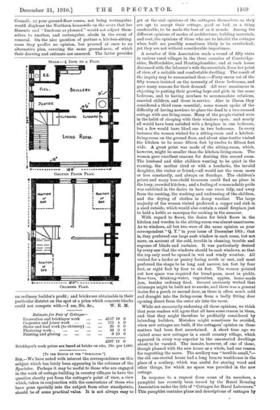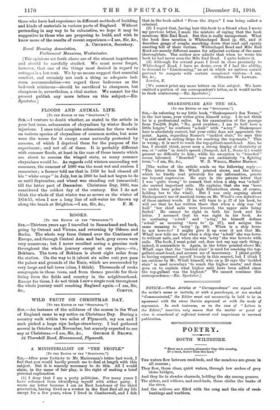[TO TICE EDITOR 01 THE "SPECTATOR. " ] SIE, — We have noted with
interest the correspondence on this subject which has lately been appearing in the columns of the Spectator. Perhaps it may be useful to those who are engaged in the work of cottage-building in country villages to have the question shortly put from the cottager's point of view, a view which, taken in conjunction with the conclusions of those who have gone specially into the subject from other standpoints, should be of some practical value. It is not always easy to
get at the real opinions of the cottagers themselves, as they are apt to accept their cottage, good or bad, as a thing unalterable, to be made the best of as it stands. Among the different opinions of modes of architecture, building materials, and cost, the opinions of those who are to inhabit the cottages when built are possibly sometimes likely to be overlooked ; yet they are not without considerable importance.
A member of this Association made a round of fifty visits in various rural villages in the three counties of Cambridge- shire, Bedfordshire, and Huntingdonshire, and at each house discussed with the labourer's wife the essentials, from her point of view, of a suitable and comfortable dwelling. The result of the inquiry may be summarised thus :—Forty-seven out of the fifty women insisted on the necessity of three bedrooms, and gave many reasons for their demand. All were unanimous in objecting to putting their growing boys and girls in the same bedroom, and to having nowhere to accommodate relations, married children, and those in service. Also in illness they considered a third room essential; some women spoke of the difficulty of having nowhere to place the dead in a two-roomed cottage with one living-room. Many of the people visited were in the habit of sleeping with their windows open : and nearly all would have been satisfied with a fireplace in one bedroom, but a few would have liked one in two bedrooms. In every instance the women wished for a sitting-room and a kitchen- living-room on the ground floor, and about nine-tenths wished the kitchen to be some fifteen feet by twelve to fifteen feet wide. A great point was made of the sitting-room, which, however, might be smaller than the kitchen-living-room. The women gave excellent reasons for desiring this second room. The husband and elder children wanting to be quiet in the evening, the mother tired or with a headache, the invalid daughter, the visitor or friend,—all would use the room more or less constantly, and always on Sundays. The children's prizes and many household treasures could find no place in the busy, crowded kitchen ; and a feeling of commendable pride was exhibited in the desire to have one room tidy, and away from the cooking, the washing and undressing of the children, and the drying of clothes in damp weather. The large majority of the women visited preferred a copper and sink in a shed outside, which would also contain a small fireplace just to hold a kettle or saucepan for cooking in the summer.
With regard to floors, the desire for brick floors in the kitchen and wooden in the sitting-room was almost unanimous. As to windows, all but two were of the same opinion as your correspondent "Q. Y." in your issue of December 10th; that is, they preferred one large sash window in each room, but not more, on account of the cold, trouble in cleaning, trouble and expense of blinds and curtains. It was particularly desired by every one that the windows should be sash windows, so that the top only need be opened in wet and windy weather. All wished for a larder or pantry facing north or east, and most preferred the shape to be long and narrow, ten feet by four feet, or eight feet by four to six feet. The women pointed out how space was required for bread-pans, meat in pickle, flour-bins, drinking-water, vegetables, apples, home-made jam, besides ordinary food. Several anxiously wished that chimneys might be built not to smoke, and there was a general desire for a porch or second door, as there is often much cold and draught into the living-room from a badly fitting door opening direct from the outer air into the room.
While not necessarily endorsing all these opinions, we think that your readers will agree that all have some reason in them, and that they might therefore be profitably considered by intending builders. Mistakes might sometimes be avoided, when new cottages are built, if the cottagers' opinion on these matters had been first ascertained. A short time ago we visited some new cottages in a small country village, which appeared in every way superior to the one-storied dwellings about to be vacated. The inmate, however, of one of these, though pleased with the new house as a whole, had one reason for regretting the move. The scullery was "terrible small,"— the old one-storied house had a long lean-to waahhouse in the place of a scullery, which was useful for storing wood and other things, for which no space was provided in the new cottage.
In response to a request from some of its members, a pamphlet has recently been issued by the Rural Housing Association under the title of " Cottages for Rural Labourers." This pamphlet contains plans and descriptions of cottages by those who have had experience in different methods of building and kinds of materials in various parts of England. Without pretending in any way to be exhaustive, we hope it may be suggestive to those who are proposing to build, and wish to know more of the results of recent experience.—I am, Sir, &c., A. OHURTON, Secretary. Rural Housing Association,
Parliament Mansions, Westminster.
[The opinions set forth above are of the utmost importance, and should be carefully studied. We must never forget, however, that one of the things most desired in regard to cottages is a low rent. We by no means suggest that essential comfort, and certainly not such a thing as adequate bed- room accommodation—we regard three bedrooms as the bed-rock minimum—should be sacrificed to cheapness, but cheapness is, nevertheless, a vital matter. We cannot for the present publish any more letters on this subject.—En. Spectator.]







































 Previous page
Previous page